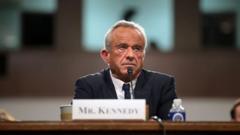Kennedy, nominated by President Trump as health secretary, defended his past comments on vaccinations, addressed abortion rights, and discussed the U.S. food industry amidst protests and applause.
Robert F. Kennedy Jr., who has been nominated by President Donald Trump as U.S. Secretary of Health, was subjected to intense scrutiny during his first confirmation hearing held before the Senate Finance Committee. This significant role oversees public health issues, including medical research and food safety.
Kennedy, known for his vocal skepticism regarding vaccines, faced questions about his comments on the Covid-19 vaccine and other immunizations. While his hearing was intermittently interrupted by protesters, he garnered support from parts of the audience when he echoed the administration's slogan about restoring health to America.
One critical area of concern focused on Kennedy's previous views on vaccines. For eight years, he led the group Children's Health Defense, which consistently raised doubts about the safety and efficacy of childhood vaccines. During the hearing, Kennedy insisted he was not anti-vaccine, asserting his belief in the need for more rigorous safety assessments rather than promoting doubt. He claimed his remarks were often taken out of context and emphasized support for the current childhood vaccination schedule.
The discussion also touched upon his stance on dietary issues, where Kennedy criticized processed foods as contributing to the obesity epidemic. He committed to addressing conflicts of interest within U.S. food agencies, aiming to combat chronic diseases. He expressed that while he supported healthy dietary practices, people should still have access to popular fast food options, referencing Trump's affinity for McDonald's.
Abortion rights emerged as another hot topic during the hearing. Kennedy, who has fluctuated in his views, stated that every abortion is a tragedy, aligning with President Trump's perspective on state-controlled access to abortion. This stance opened him up to criticism from Democratic senators who accused him of abandoning his pro-choice principles in offing Biden's presidency.
Senator Bernie Sanders grilled Kennedy on whether healthcare should be guaranteed as a human right, to which Kennedy provided a nuanced response. Sanders also highlighted discrepancies in drug pricing between the U.S. and Europe and queried Kennedy's thoughts on anti-vaccine slogans marketed for baby clothes by Children's Health Defense, a group Kennedy established.
The hearing illustrated a clear division, with Democrats probing Kennedy's past comments on vaccines and misinformation, while Republicans mostly lauded his health advocacy and views on reducing chronic child diseases. Republican Senator Ron Johnson claimed Kennedy was a "solution to his prayers", while Democratic Senator Ron Wyden reflected skepticism, describing Kennedy's responses as "untrustworthy and unprepared".
As Kennedy's confirmation process continues with another hearing set for Thursday before a different committee, the political landscape surrounding his position remains contentious. Voting by the committees will precede a decision in the wider Senate, determining his potential role in shaping U.S. health policy.
Robert F. Kennedy Jr., who has been nominated by President Donald Trump as U.S. Secretary of Health, was subjected to intense scrutiny during his first confirmation hearing held before the Senate Finance Committee. This significant role oversees public health issues, including medical research and food safety.
Kennedy, known for his vocal skepticism regarding vaccines, faced questions about his comments on the Covid-19 vaccine and other immunizations. While his hearing was intermittently interrupted by protesters, he garnered support from parts of the audience when he echoed the administration's slogan about restoring health to America.
One critical area of concern focused on Kennedy's previous views on vaccines. For eight years, he led the group Children's Health Defense, which consistently raised doubts about the safety and efficacy of childhood vaccines. During the hearing, Kennedy insisted he was not anti-vaccine, asserting his belief in the need for more rigorous safety assessments rather than promoting doubt. He claimed his remarks were often taken out of context and emphasized support for the current childhood vaccination schedule.
The discussion also touched upon his stance on dietary issues, where Kennedy criticized processed foods as contributing to the obesity epidemic. He committed to addressing conflicts of interest within U.S. food agencies, aiming to combat chronic diseases. He expressed that while he supported healthy dietary practices, people should still have access to popular fast food options, referencing Trump's affinity for McDonald's.
Abortion rights emerged as another hot topic during the hearing. Kennedy, who has fluctuated in his views, stated that every abortion is a tragedy, aligning with President Trump's perspective on state-controlled access to abortion. This stance opened him up to criticism from Democratic senators who accused him of abandoning his pro-choice principles in offing Biden's presidency.
Senator Bernie Sanders grilled Kennedy on whether healthcare should be guaranteed as a human right, to which Kennedy provided a nuanced response. Sanders also highlighted discrepancies in drug pricing between the U.S. and Europe and queried Kennedy's thoughts on anti-vaccine slogans marketed for baby clothes by Children's Health Defense, a group Kennedy established.
The hearing illustrated a clear division, with Democrats probing Kennedy's past comments on vaccines and misinformation, while Republicans mostly lauded his health advocacy and views on reducing chronic child diseases. Republican Senator Ron Johnson claimed Kennedy was a "solution to his prayers", while Democratic Senator Ron Wyden reflected skepticism, describing Kennedy's responses as "untrustworthy and unprepared".
As Kennedy's confirmation process continues with another hearing set for Thursday before a different committee, the political landscape surrounding his position remains contentious. Voting by the committees will precede a decision in the wider Senate, determining his potential role in shaping U.S. health policy.


















